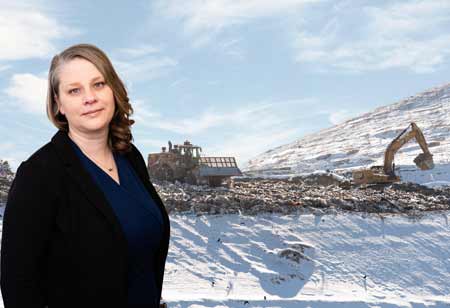Amy Davies, P.E., is Casella Waste Systems, Inc.’s Regional Environmental & Compliance Manager, overseeing compliance, permitting, construction, and remediation programs at 58 waste management facilities across Northern New York and Vermont. These include active and closed landfills, recycling, and composting facilities. A licensed professional engineer with a civil engineering degree from Clarkson University, she began her career at the Clinton County Landfill and has a deep commitment to community service. She serves as the Technical Program Coordinator for the Federation of New York Solid Waste Conference and volunteers with several local organizations.
Through this article, Amy Davies shares her career journey and insights on environmental leadership. She emphasizes the importance of curiosity, collaboration, and continuous learning in driving sustainable waste management practices. Davies also discusses the growing need for skilled environmental engineers and offers advice for aspiring engineers, highlighting the power of effective communication in promoting environmental stewardship.
Blending Expertise And Vision: Driving Their Surrounding Communities Environmental Initiatives In Waste Management
Curiosity is fundamental to successful entrepreneurship and engineering, driving us to understand complex problems, develop solutions, and continuously improve. Conserving disposal capacity is paramount in waste management. At Casella, I implement operational initiatives to optimize airspace usage and expand community outreach programs to divert waste toward better uses.
Despite our sizeable corporate structure, Casella fosters creative partnerships with facility managers and community leaders to create sustainable waste management programs. Our collaboration with host communities ensures the viability, longevity, and sustainability of their local waste management strategies.
Staying Ahead Of The Curve: Continuous Learning And Industry Engagement
Remaining at the forefront of emerging trends and technologies in environmental engineering requires active involvement and a commitment to continuous learning. As the Technical Program Advisor for the Federation of NY Solid Waste Conference and Tradeshow, I can network with industry leaders, explore new waste management concepts and technologies, and stay informed about evolving regulations.
I encourage fellow professionals to actively participate in industry conferences, which are often volunteer-driven and offer invaluable professional development and networking opportunities.
My approach is rooted in environmental stewardship. I prioritize sustainable practices for site development that minimize longterm impacts on facilities and their surrounding communities.
The Future Of Environmental Engineering: Bridging The Talent Gap
Despite technological advancements, the demand for skilled environmental engineers continues to grow. Drones, satellites, and modeling software are valuable tools but cannot replace the expertise needed to apply these technologies within regulatory frameworks. Unfortunately, I’ve observed a widening gap between the demand for environmental engineers and the available talent pool. This shortage has significant implications for various ecological sectors.
I’m committed to promoting engineering as a career path to address this challenge. This includes sharing my experiences through engaging social media posts, supporting STEM programs in high schools, participating in career outreach events, and showcasing environmental engineering services within the waste industry at events like the Clinton County Landfill Open House.
Fostering Environmental Consciousness: Continuous Education And Knowledge Sharing
A robust compliance program requires continuous education and a culture of shared knowledge. I encourage my team’s engagement in virtual workshops, lunch-and-learns, and conferences covering various environmental topics, including water and air quality, organics and waste management, and sustainability. Casella supports this by providing our environmental team with monthly webinars from external consultants.
Furthermore, I actively share best management practices, regional trends, and potential pitfalls with my regional team. By fostering continuous learning and knowledge sharing, we strengthen environmental consciousness and compliance across our operational footprint.
Environmental Stewardship: Guiding Principles For Engineering And Leadership
My approach to engineering and leadership is deeply rooted in environmental stewardship principles. I prioritize sustainable practices in site development, minimizing the long-term impact of our facilities on surrounding communities. I mentor my employees to analyze environmental data trends proactively, preventing compliance issues before they arise.
Furthermore, I encourage my team to support our sustainability and community engagement goals actively. This includes participating in educational campaigns at local schools to promote waste reduction, organizing specialized events focused on diverting waste from landfills, and volunteering with local organizations for community green-up initiatives.
Advice For Aspiring Engineers: Embrace Your Strengths And Communicate Effectively
I advise aspiring engineers to embrace their unique strengths and leverage them to make a meaningful impact on environmental sustainability. For me, that strength lies in communication. I’ve never viewed my communications degree as a detour or a failed career path. Instead, I see it as an invaluable asset that has enabled me to effectively promote environmental stewardship, advocate for the engineering profession, and highlight the ecological benefits that Casella’s facilities provide to their host communities.
Strong communication skills are essential for promoting brand awareness, sharing industry insights, and developing educational materials explaining our modern facilities’ complex environmental control systems. By leveraging my communication skills, I’ve contributed meaningfully to the circular economy solution within the waste management industry.



